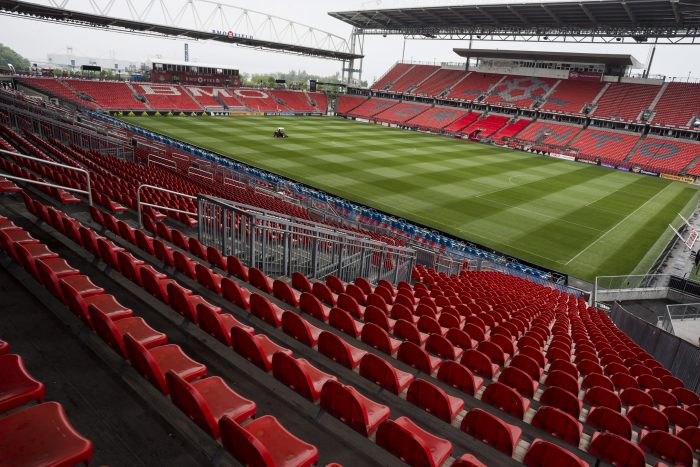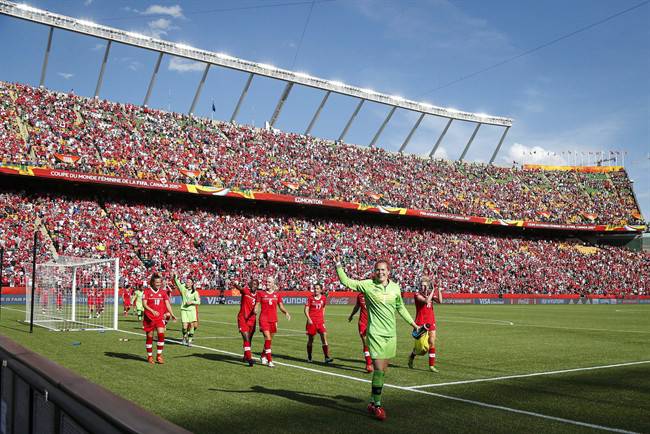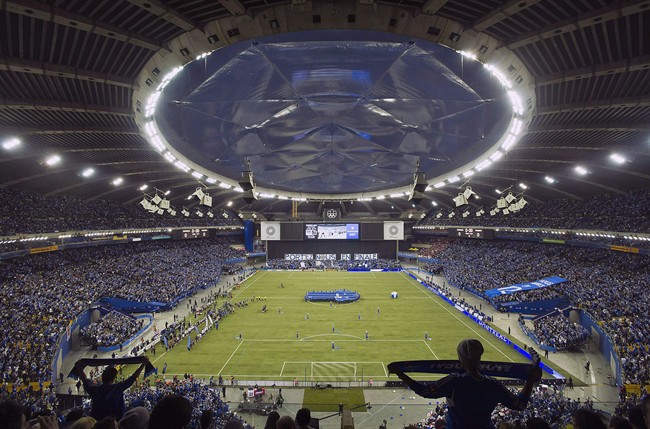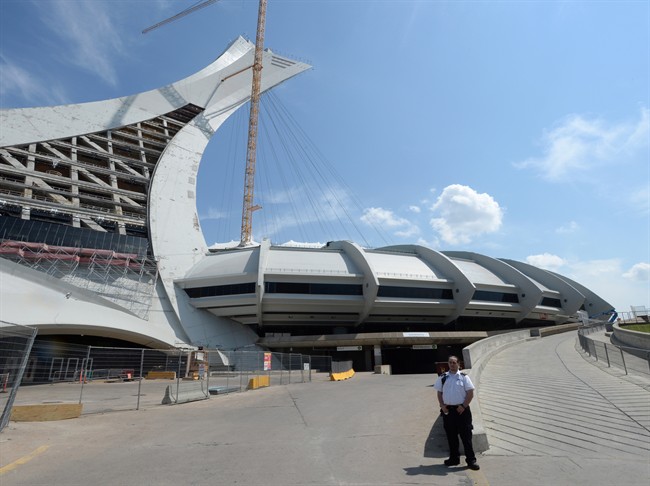Some of the best footballers on the planet will hit the pitch in Canada in 2026, but where they’ll play is still up in the air.

The so-called “United” North American bid to host the 2026 FIFA Men’s World Cup includes Toronto, Montreal and Edmonton as potential sites for the 10 games to be played in Canada. And unlike with most Olympic bids, there’s no need to build massive new facilities to accommodate the tournament.
“Most of the infrastructure, the base, is already there, so we’re talking renovations more than anything else,” said Milena Parent, a professor of sports event management at the University of Ottawa.
All three cities stand ready to welcome the World Cup in 2026, but Parent says there’s no guarantee they’ll all make the cut.
WATCH: Canada, U.S., Mexico to co-host 2026 FIFA World Cup

FIFA will select up to 16 of the 23 venues put forward in the United bid, meaning at least seven cities will be nixed before the final schedule is drawn up. Canada will only host early-round games according to the United bid.
“My guess is Toronto and Montreal will definitely be there,” Parent told Global News on Wednesday. She said Edmonton has the longest shot in the bid, largely because of logistics issues and its more northern location.

But regardless of which cities are selected, there’s still plenty of work to be done to get their respective venues up to snuff.
Toronto’s BMO Field, Edmonton’s Commonwealth Stadium and Montreal’s Olympic Stadium are the three possibilities to host World Cup Games.
Here’s a look at each.
Toronto – BMO Field

The home stadium of Major League Soccer’s Toronto FC sits on the shore of Lake Ontario in the city’s waterfront district, right next to Exhibition Place.
BMO Field was built in 2007 and underwent its first major renovation in 2015-16, after it was acquired by current owner Maple Leafs Sports & Entertainment.
MLSE and the City of Toronto poured $150 million into the facility to add new dressing rooms, 8,400 seats and a new video board, along with other amenities.
The stadium has a current capacity of 30,000, leaving it well shy of the 45,500 seats promised in the FIFA bid. However, MLSE says it has another expansion in the works, along with plans to set up additional temporary seating for the event.
WATCH BELOW: Take a tour of BMO Field after its last major renovation

BMO Field has hosted a number of soccer tournaments, including the FIFA U-20 Women’s World Cup in 2014, the CONCACAF Gold Cup and three Major League Soccer finals.

Get breaking National news
Parent says the biggest challenge for Toronto will be accommodating the influx of international visitors for the tournament.
“The transit system in Toronto will have to be ready for that,” she said.
Parent predicts many locals will want to get out of town for the event, while those who stay will likely face transportation-related issues due to the tournament. That might include the return of the high-occupancy vehicle lanes that the province implemented in 2015, when Toronto hosted the Pan Am Games.
“There’s going to be disruptions,” Parent said.
FIFA has described Toronto’s transit system as “fair to good.”
Toronto Mayor John Tory trumpeted the successful bid on Twitter Tuesday, saying: “We won!”
BMO Field is the only potential Canadian venue that already has natural grass in place — a necessary requirement to host any FIFA men’s tournament.
Edmonton – Commonwealth Stadium

Edmonton’s Commonwealth Stadium is the largest of Canada’s three potential venues, with an anticipated 56,418 seats expected to be ready for the FIFA tournament.
The open-air stadium was built in 1978 and renovated in 2012, although FIFA says more renovations would be needed to prepare it for the tournament.
Commonwealth Stadium typically plays host to the Edmonton Eskimos of the Canadian Football League, but it’s also served as a site for several soccer tournaments in the past, including the 2015 FIFA Women’s World Cup.
WATCH BELOW: Canadian Soccer president on winning FIFA bid

The city-owned stadium is expected to implement natural grass for the Eskimos’ entire 2026 season to accommodate the World Cup.
FIFA previously flagged Edmonton’s relatively small airport as a potential detriment to its bid. “With less than 10 million users per year, this could call into question its positioning as an international gateway,” the organization wrote in its evaluation of the bid.
Montreal – Olympic Stadium

Montreal’s iconic Olympic Stadium will turn 50 in 2026, making it the oldest of the three potential Canadian venues.
Nevertheless, the building should be up to the task thanks to a planned $250 million renovation that will add a retractable roof, additional seating and new technology to the interior.
The United bid says Olympic Stadium can be set up for 49,905 fans, which is still well shy of the record-setting 72,000 that packed into the building for the 1976 Olympic Summer Games final between East Germany and Poland.

Olympic Stadium was once home to the now-departed Montreal Expos of the MLB, and has also played host to soccer tournaments and FIFA events in the past.
The field is usually astroturf, but it did have natural grass in place for a 2010 exhibition game between AC Milan and the Montreal Impact of the MLS.
“Montreal needs to spend money to convert the field into natural grass,” Parent said.
Pitfalls
Canada is embarking upon a potentially treacherous path with the World Cup, which has led to a number of major issues and minor headaches for other host countries.
Russia will kick off this year’s tournament on Thursday under a cloud of geopolitical malaise caused by its annexation of Crimea, poisoning of a former double agent and interference in the U.S. presidential election of 2016.
Qatar has also faced heavy criticism for human rights abuses linked to its preparations for 2022.
WATCH: Soccer’s popularity expected to increase after 2026 FIFA World Cup

Parent doesn’t anticipate any of those issues will impact Canada’s hosting efforts. However, she does expect some difficulty with navigating the different laws of Canada, the U.S. and Mexico.
“You’ve got three countries instead of one, so logistically, it’s not going to be easy,” she said.
Vancouver decided early on that it didn’t want to be part of that potential mess. The city withdrew from the United bid earlier this year, citing a lack of clarity around the terms and costs of working with FIFA on the World Cup.
FIFA cited Olympic Stadium as one of two venues in need of a major upgrade before it could host the World Cup. The tournament might also conflict with the Montreal Grand Prix, which happens at the same time in early June.
Parent says it’s tough to estimate the economic impact the World Cup might bring to the remaining potential host cities, because the tournament is best-positioned as part of a longer-term plan.
“You need to look at the event as a leverage point for upgrading the facilities, making accessibility and tourist aspects more user-friendly, changing the image of the city (and) changing the image of the country,” she said.
“It should not be about the money.”
Bringing the World Cup to Canada could help inspire a new generation of players and coaches, especially if Canada is included in the expanded field of 48 teams.
However, it’s unclear at this point if that will be the case, because FIFA would need to grant all three host nations (Canada, the U.S. and Mexico) an automatic berth.
Parent says the World Cup will present Canada with a chance to show far-flung parts of the world that “we don’t live in igloos.”
Parent says Canada already showed it could pull off a FIFA event with the Women’s World Cup, so she’s confident it can do so again.
“I’m not so worried,” she said.
WATCH BELOW: FIFA president says he’s not concerned with Trump interference





Comments
Want to discuss? Please read our Commenting Policy first.